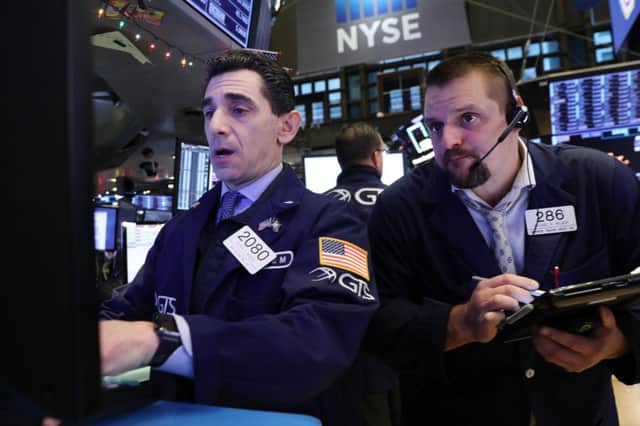Bill Jamieson: Scary days ahead amid Brexit chaos and tumbling markets


But no less concerning have been developments in financial markets. Last week stock markets worldwide tumbled on growing fears of a global slowdown and the possibility that America and Europe may be close to, if not actually in, recession by the end of next year.
In New York the world’s largest equity market plunged again last week, with share prices suffering their worst December performance since the Great Depression. The Dow Jones lost another 208 points on Friday, taking the index down to 22,651 for a fall of 3,242 points or 12.5 per cent since the start of the month. Major indices slumped to 20-month lows after the US Federal Reserve shrugged off signs of an economic slowdown and raised interest rates for the fourth time this year.
Advertisement
Hide AdAdvertisement
Hide AdIn the UK, the FTSE100 Index has wiped out all the gains of the past 12 months and has now fallen almost 14 per cent to 6,705 since its peak in May.
The move by the US central bank last Wednesday to stick to its plan for more rate increases over the next two years – unwinding quantitative easing and determined to keep its balance sheet reduction plan on course – heightened concerns over slowing growth.
Energy stocks were notably weak as oil prices declined to their lowest levels in a year, the price of Brent crude falling to $54.55 a barrel, down by some $30 a barrel since October and the level of $114 back in 2014 a distant memory. Technology and consumer discretionary shares also suffered heavy declines.
For the moment it looks more like a growth slowdown for the US, not a full-blown recession. The central bank trimmed its forecasts for growth next year to 2.3 per cent from 2.5 per cent, while leaving its unemployment prediction for 2019 unchanged at 3.5 per cent.
Only in October, Fed chairman Jay Powell gave a highly upbeat assessment of the US economy. That prompted unease as investors sought to price in a succession of further rate rises. But barely a month later he signalled that the central bank might not need to lift rates far to get them into the “neutral” range of estimates.
The key question now is whether Powell is determined to dampen household and business debt demand. One analyst at the end of last week likened central bank interest rate policy to pulling a brick on a rubber band. It barely seems to move, encouraging the chairman to pull the rubber band harder – until the brick suddenly leaps forward and hits him in the face.
Last week saw the Bank of England cut its economic forecast for the final quarter of this year to 0.2 per cent following growth of 0.6 per cent in the previous quarter.
And it says it expects slower growth to continue in 2019. Interest rate hawks on the Monetary Policy Committee are keen to see interest rates raised to one per cent but any such move is unlikely so long as Brexit uncertainty persists.
Advertisement
Hide AdAdvertisement
Hide AdThe Government’s decision to abandon a vote on the Brexit deal triggered a drop in the pound and dragged down share prices. Commercial bank funding costs had also “risen sharply”, the Bank noted, which could push up consumer borrowing costs.
A separate Bank survey suggested that business services firms, including law and accountancy companies, believed activity could slow “sharply” in the event of a no-deal Brexit. Businesses are investing less and it’s likely to stay that way for months.
And as if signs of a slowdown in the service sector was not enough, news that UK car production tumbled by almost 20 per cent last month adds to concerns over a real economy slowdown. The Society of Motor Manufacturers and Traders blamed weaker demand in the UK and in export markets. Exports fell by almost 23 per cent in November – the fifth consecutive month that exports have declined. Last year the UK exported more than 1.3 million cars, of which more than half (54 per cent) went to the EU.
It is the combination of Brexit uncertainties and darkening prospects for the world economy that is set to make the opening weeks of 2019 a scary period. Businesses, already reluctant to plan investment and expansion because of Brexit concerns, are likely to draw in their horns even further at the prospect of a global demand downturn.
As for consumer spending, this, too, looks to have been hit. The CBI distributive trades balance unveiled last week fell back sharply in December to a 13-month low. Sales overall for the time of the year were reported to be the weakest since November 2011. Further indicating a lack of confidence, orders placed with suppliers dropped in the year to December at the quickest pace since October 2017. Retailers are pessimistic about the prospect for sales in January with a balance of minus 22 per cent expecting sales to remain below average in January.
Howard Archer, chief economic advisor to the EY ITEM Club, said the survey pointed to a sharp weakening of retail sales in the first half of December and end of November.
However, a notably different picture emerged from the Office for National Statistics which reported last week that retail sales volumes spiked 1.4 per cent month-on-month in November and were up 3.6 per cent year-on-year.
Who to believe? One theory is that the extended squeeze on purchasing power has encouraged consumers to become more savvy in their Christmas shopping, delaying purchases until the last minute. But this explanation has been trotted out almost every year for the past 20 years – by now UK shoppers must be bristling with PhDs and advanced diplomas in game theory. As with the tortuous Brexit saga, we will not know the full picture until well into January.